Better Addiction Care Blogs
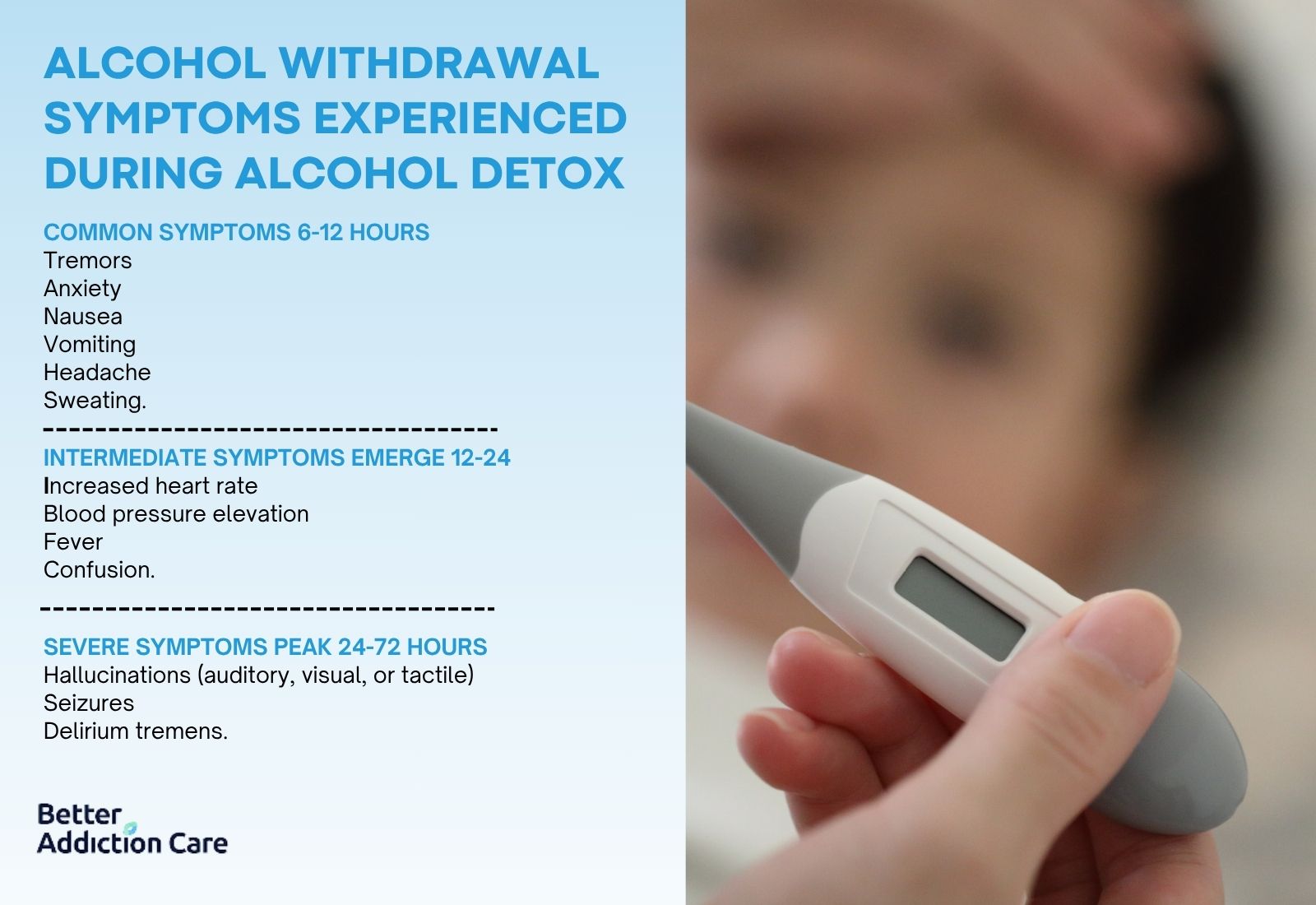
Alcohol stays in your system for 6-12 hours in blood, 3-5 days in urine, 12-24 hours in breath, and up to 90 days in hair follicles, timeframes that matter significantly given that 28.9 million Americans ages 12 and older struggled with Alcohol Use Disorder in 2023.
Alcohol stays in your system for 6-12 hours in blood, 3-5 days in urine, 12-24 hours in breath, and up to 90 days in hair follicles, timeframes that matter significantly given that 28.9 million Americans ages 12 and older struggled with Alcohol Use Disorder in 2023.
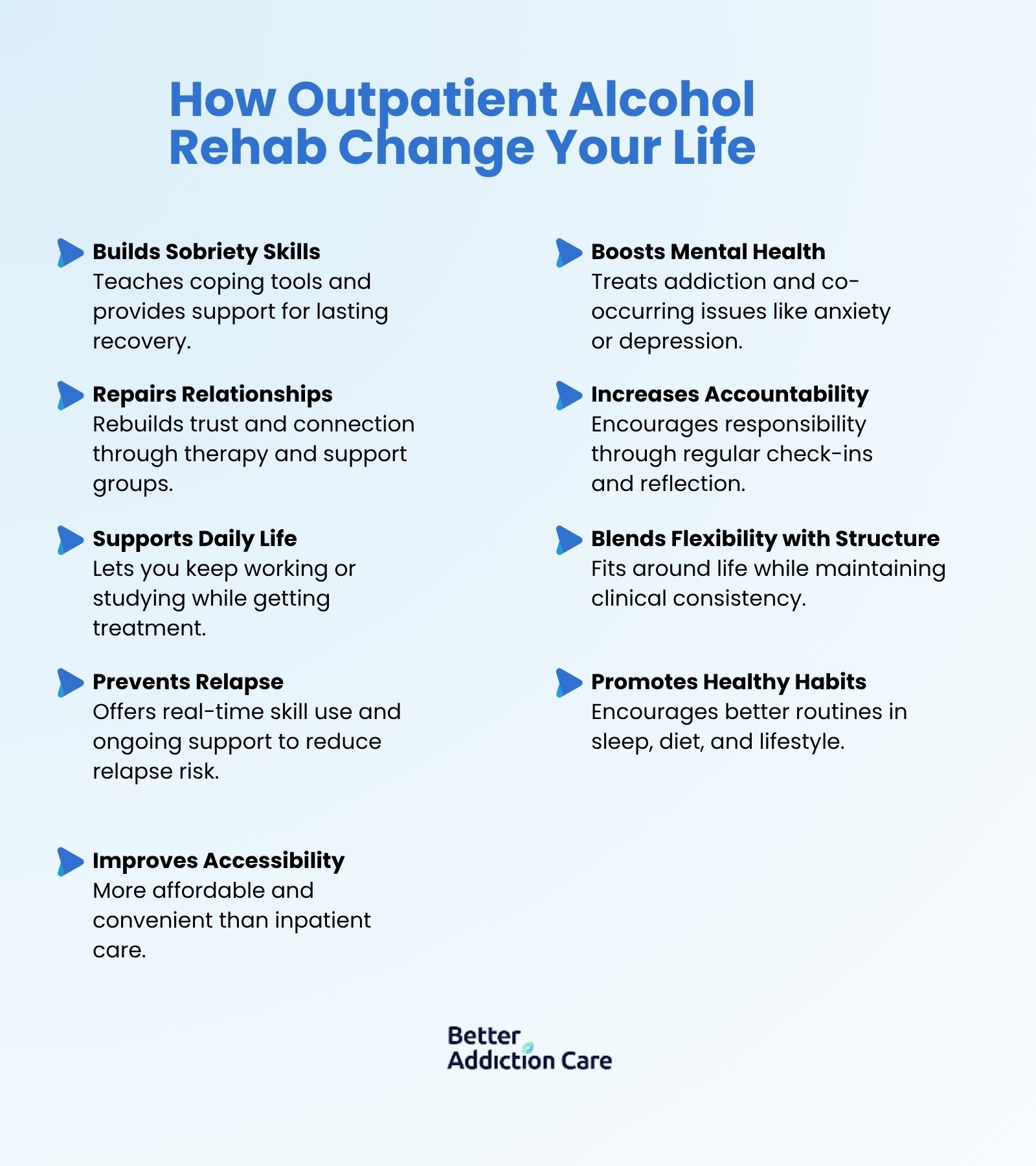
Outpatient alcohol rehab changes your life by building a foundation for long-term sobriety through practical tools and structured therapy, improving mental and emotional health, and enhancing personal relationships and social support.
Outpatient alcohol rehab changes your life by building a foundation for long-term sobriety through practical tools and structured therapy, improving mental and emotional health, and enhancing personal relationships and social support.
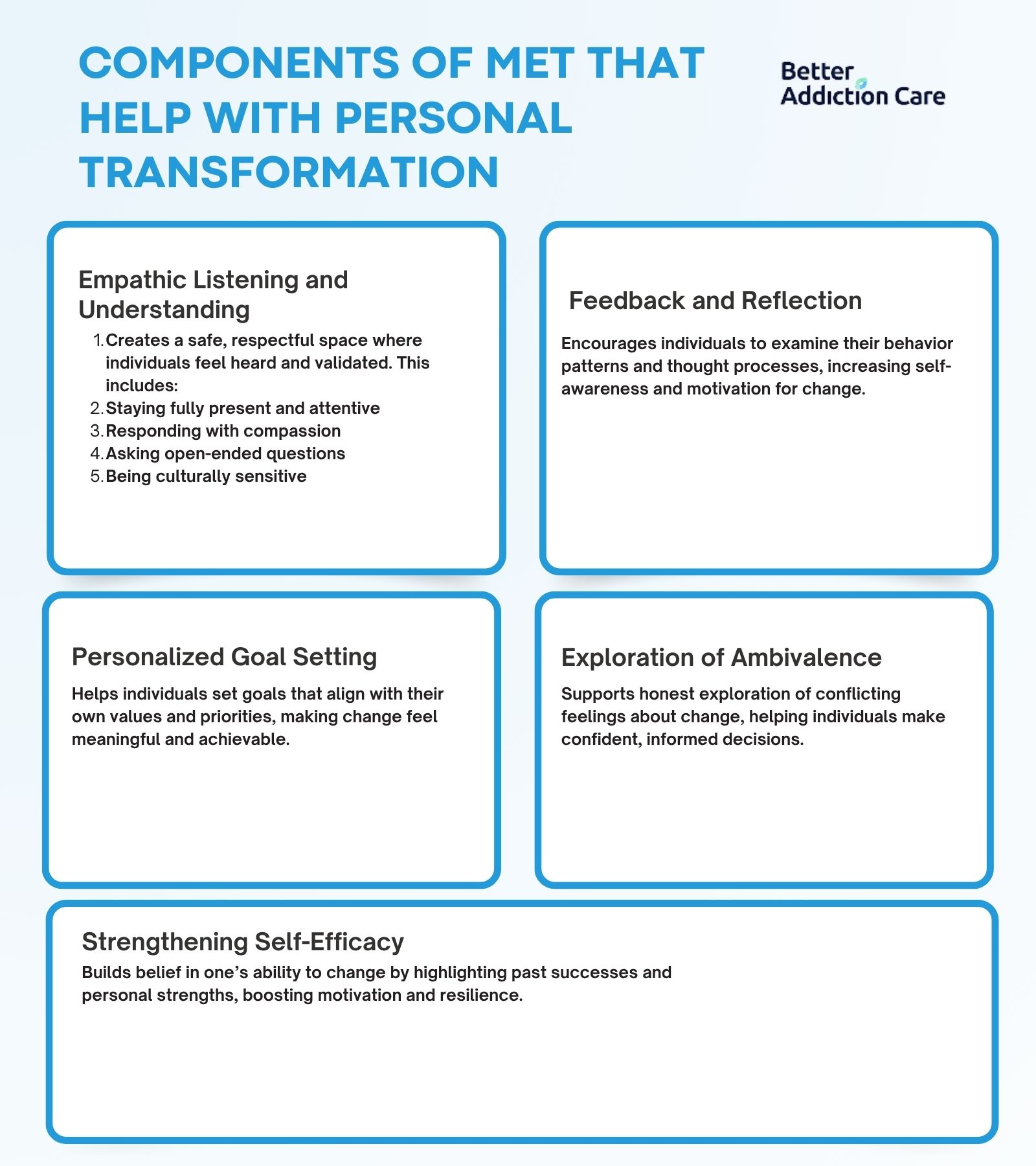
Motivational Enhancement Therapy (MET) is a person-centered intervention that fosters internal motivation for change. It assists individuals facing substance use issues through empathic listening, introspective questioning, and constructive feedback.
Motivational Enhancement Therapy (MET) is a person-centered intervention that fosters internal motivation for change. It assists individuals facing substance use issues through empathic listening, introspective questioning, and constructive feedback.
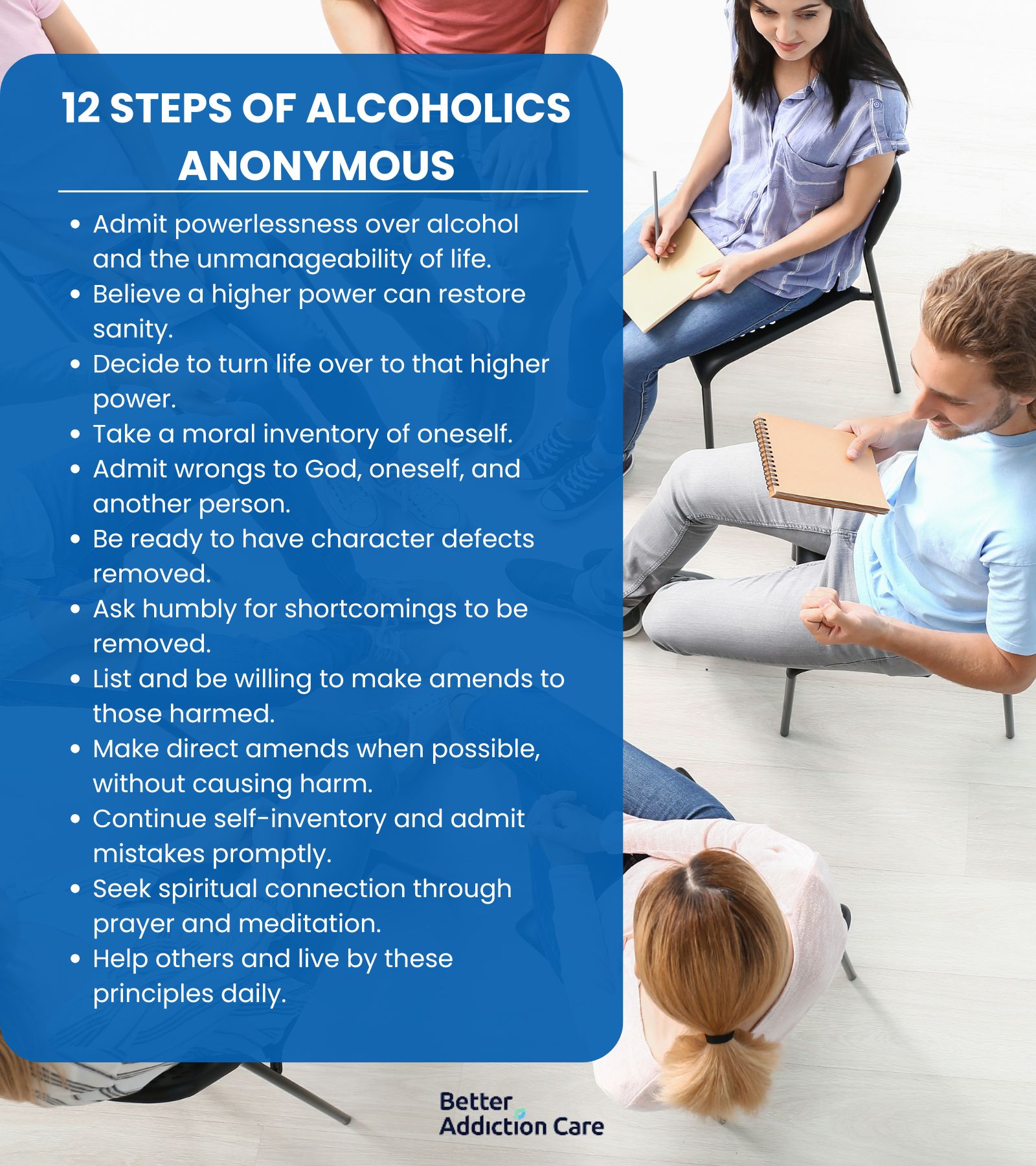
Alcoholics Anonymous (AA) offers a welcoming, community-based path to recovery if you're seeking support for alcohol addiction. AA is built around the 12 Steps principles that guide personal healing, accountability, and lasting sobriety.
Alcoholics Anonymous (AA) offers a welcoming, community-based path to recovery if you're seeking support for alcohol addiction. AA is built around the 12 Steps principles that guide personal healing, accountability, and lasting sobriety.
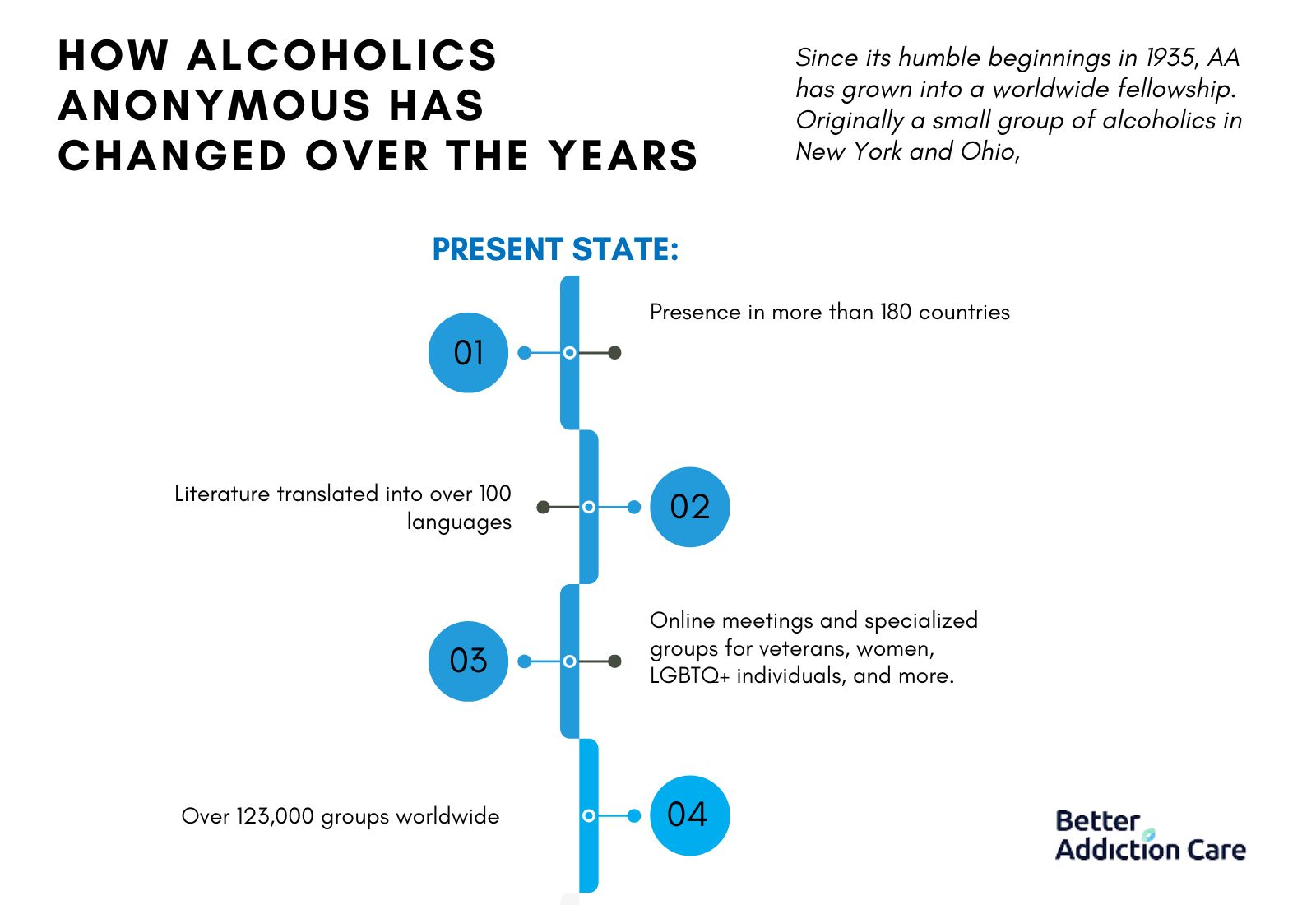
For millions around the world, recovery began with a simple yet powerful truth: you don’t have to face addiction alone. Alcoholics Anonymous (AA), founded in 1935 in Akron, Ohio, started as a grassroots effort between two men seeking sobriety. Today, it has grown into a global fellowship with over 120,000 groups spanning 180 countries.
For millions around the world, recovery began with a simple yet powerful truth: you don’t have to face addiction alone. Alcoholics Anonymous (AA), founded in 1935 in Akron, Ohio, started as a grassroots effort between two men seeking sobriety. Today, it has grown into a global fellowship with over 120,000 groups spanning 180 countries.

Young people in the United States, particularly teens and college students, frequently utilize alternative names to describe various sorts of alcoholic beverages. These colloquial and informal words assist them in disguising their alcohol drinking habits, particularly from parents and authorities.
Young people in the United States, particularly teens and college students, frequently utilize alternative names to describe various sorts of alcoholic beverages. These colloquial and informal words assist them in disguising their alcohol drinking habits, particularly from parents and authorities.
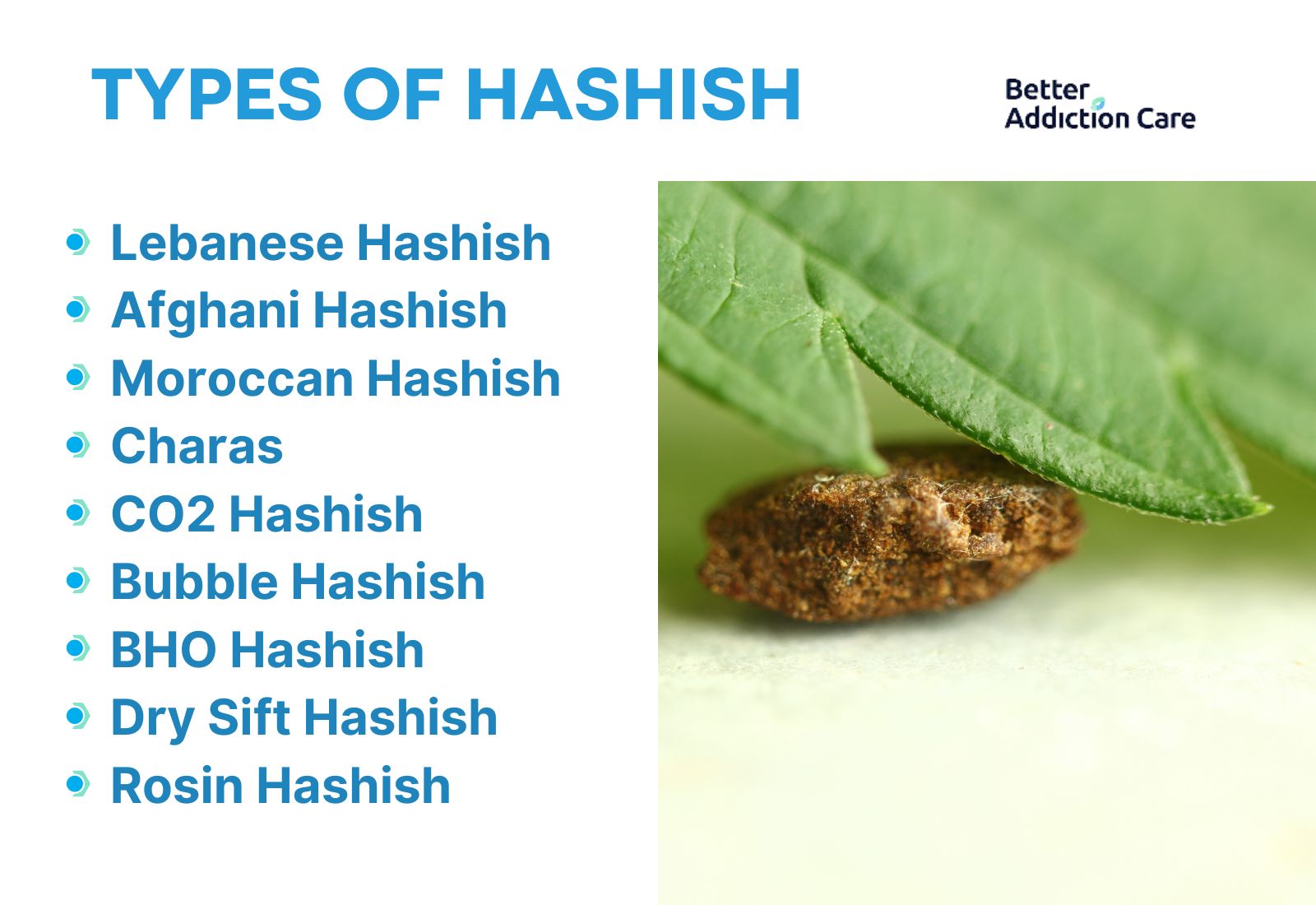
`Hashish addiction, known as hash addiction, is the dependence on the cannabis plant i. The plant is made by compressing trichomes - the resin-rich glands of cannabis flowers. These tiny trichomes have higher tetrahydrocannabinol (THC) content which produces a stronger psychoactive effect than marijuana.
`Hashish addiction, known as hash addiction, is the dependence on the cannabis plant i. The plant is made by compressing trichomes - the resin-rich glands of cannabis flowers. These tiny trichomes have higher tetrahydrocannabinol (THC) content which produces a stronger psychoactive effect than marijuana.
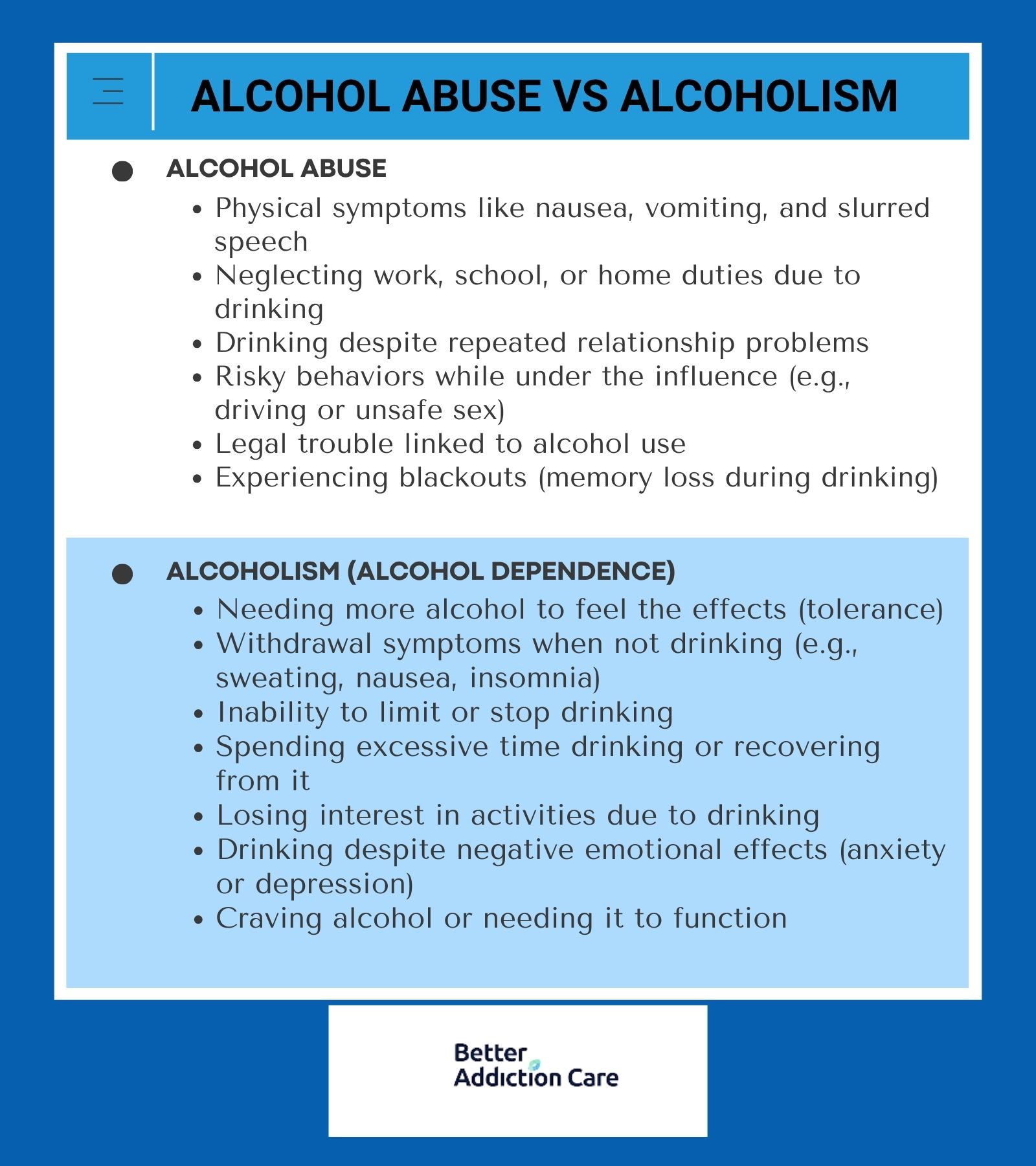
If you're wondering about the difference between alcohol abuse and alcoholism, it comes down to physical dependence. With alcohol abuse, you experience negative consequences from drinking, but aren't physically dependent. Alcoholism (or AUD) means you've developed a chemical dependence that makes it much harder to stop.
If you're wondering about the difference between alcohol abuse and alcoholism, it comes down to physical dependence. With alcohol abuse, you experience negative consequences from drinking, but aren't physically dependent. Alcoholism (or AUD) means you've developed a chemical dependence that makes it much harder to stop.
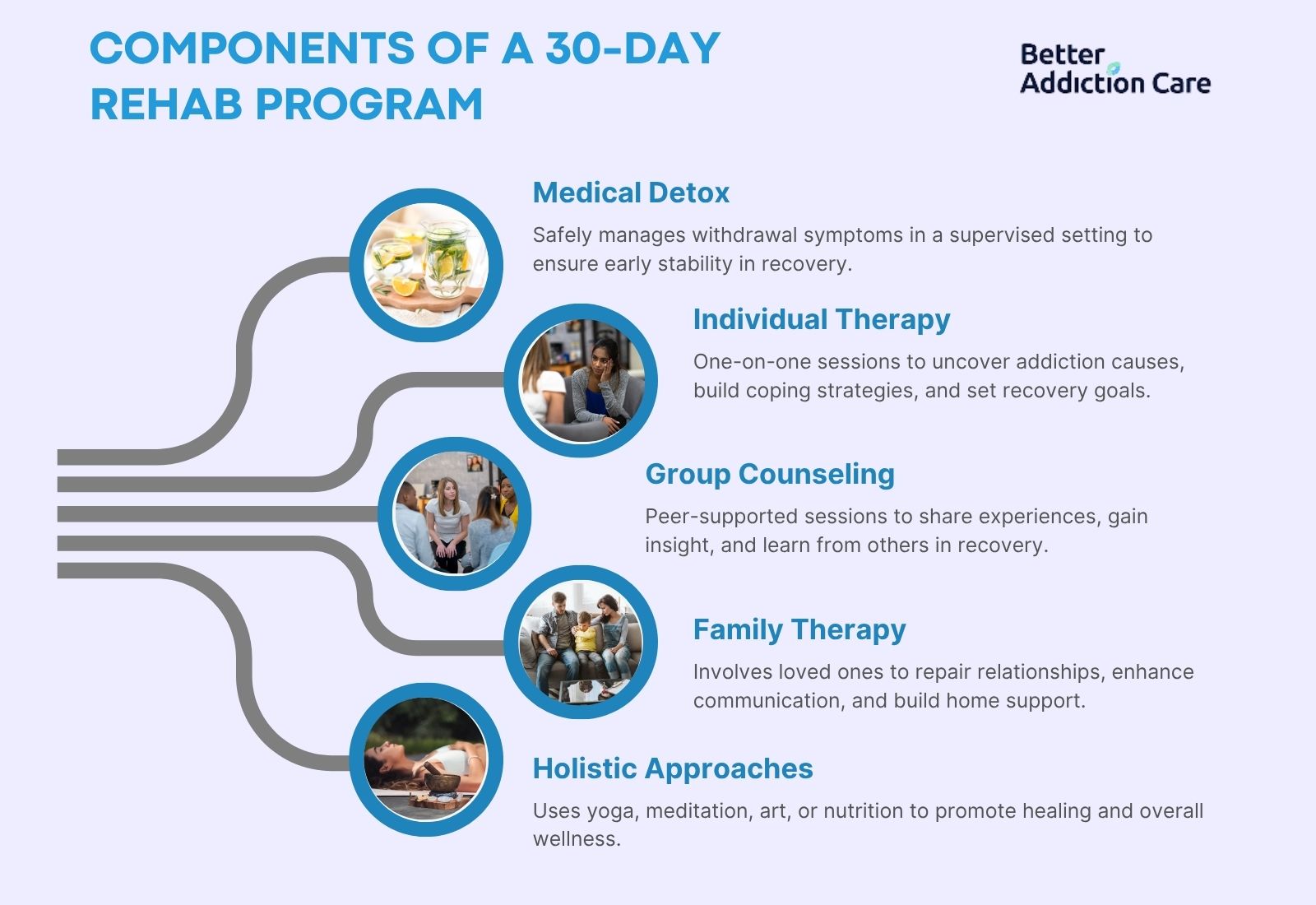
Taking the first step toward recovery is one of the hardest decisions you'll ever make, but also one of the most life-changing. A 30-day rehab program offers a focused, supportive space to begin the healing process. The latest SAMHSA data reveals that in 2023, an estimated 48.5 million Americans aged 12 and older needed treatment for substance use disorders, but only 14.6% received it. While roughly 4.5% of people sought treatment in various care settings, more than 85% of those who needed it still did not receive formal treatment .
Taking the first step toward recovery is one of the hardest decisions you'll ever make, but also one of the most life-changing. A 30-day rehab program offers a focused, supportive space to begin the healing process. The latest SAMHSA data reveals that in 2023, an estimated 48.5 million Americans aged 12 and older needed treatment for substance use disorders, but only 14.6% received it. While roughly 4.5% of people sought treatment in various care settings, more than 85% of those who needed it still did not receive formal treatment .
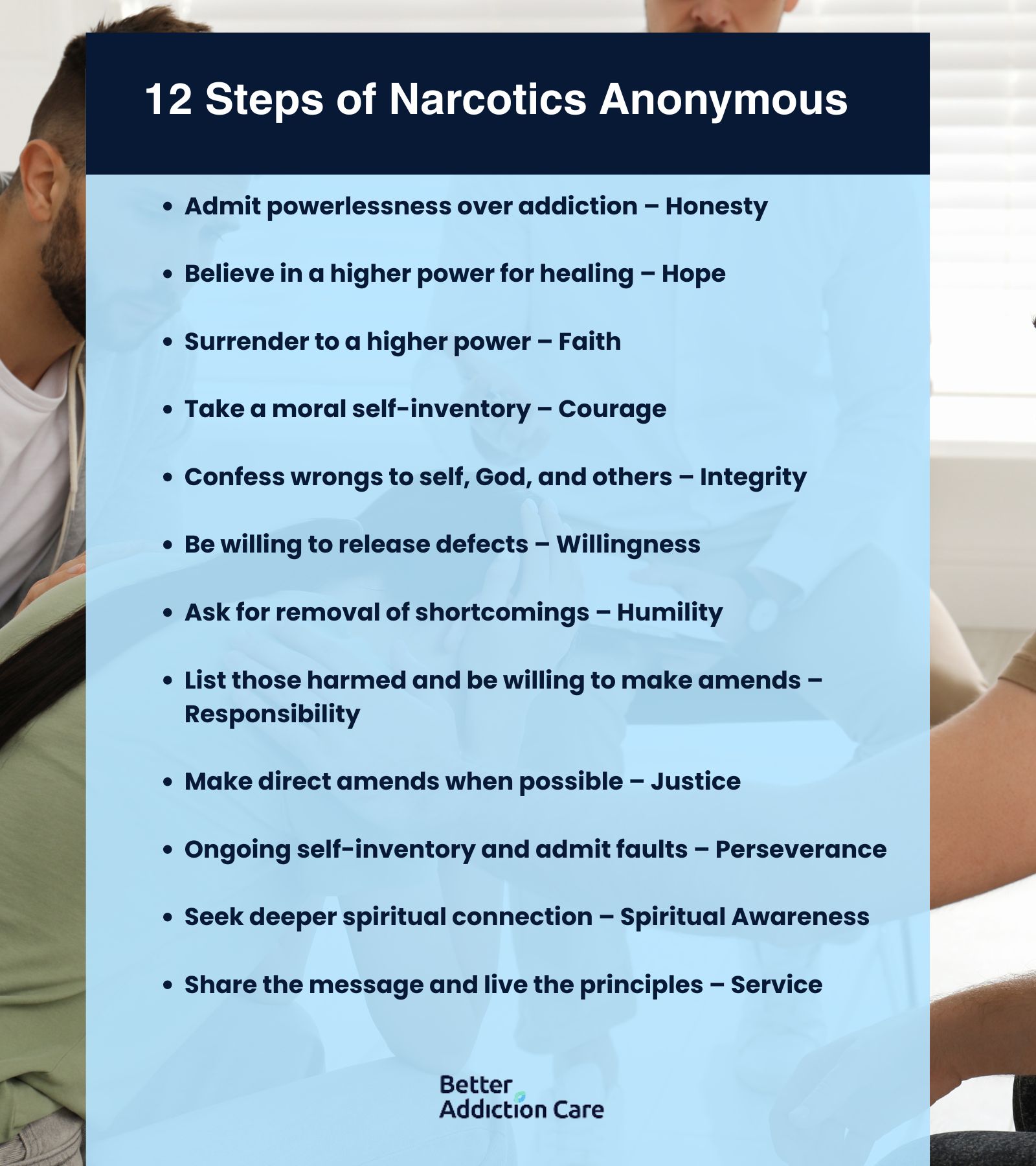
Narcotics Anonymous (NA) offers a supportive and welcoming path to recovery if you are struggling with drug addiction. NA is a nonprofit fellowship dedicated to helping individuals stop using drugs and maintain long-term sobriety. With thousands of meetings held across the U.S., it provides a free and accessible resource for those seeking help.
Narcotics Anonymous (NA) offers a supportive and welcoming path to recovery if you are struggling with drug addiction. NA is a nonprofit fellowship dedicated to helping individuals stop using drugs and maintain long-term sobriety. With thousands of meetings held across the U.S., it provides a free and accessible resource for those seeking help.
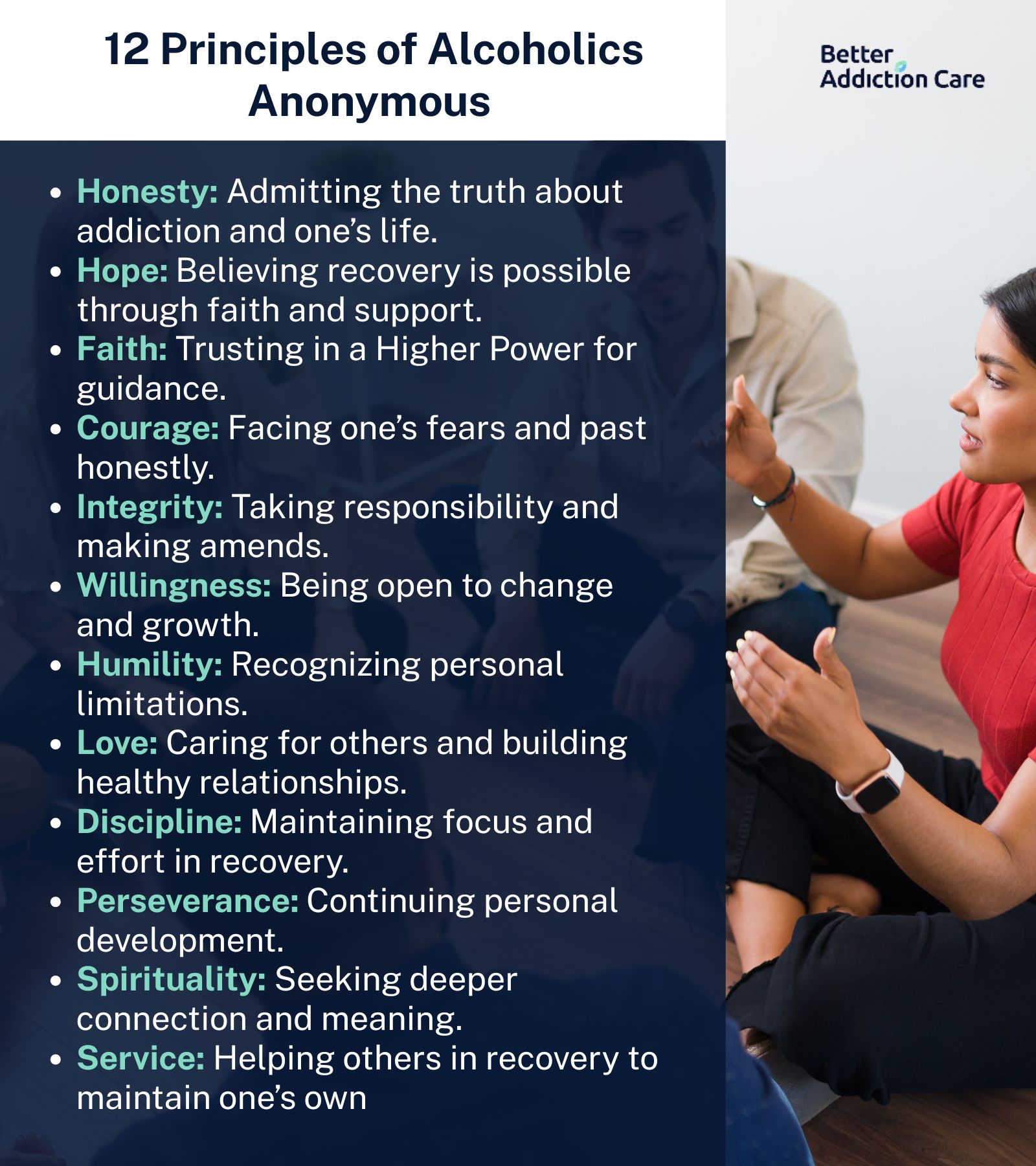
Recovery is possible, and Alcoholics Anonymous (A.A.) has helped millions find lasting sobriety. A.A. is a global fellowship where people share their experiences and support each other in overcoming alcoholism.
Recovery is possible, and Alcoholics Anonymous (A.A.) has helped millions find lasting sobriety. A.A. is a global fellowship where people share their experiences and support each other in overcoming alcoholism.
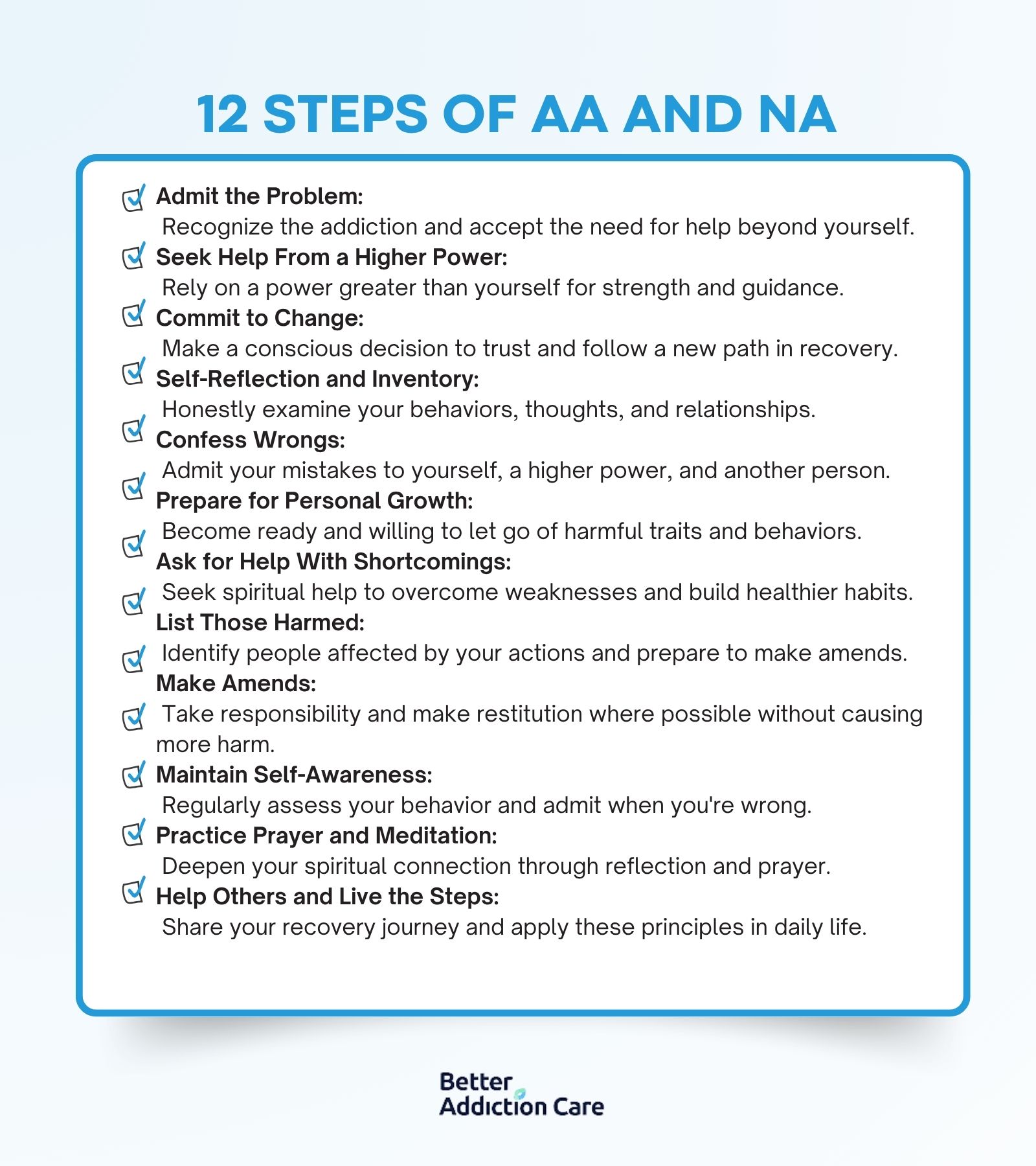
The 12 Steps of Alcoholics Anonymous (AA) and Narcotics Anonymous (NA) are structured programs designed to help individuals achieve and maintain sobriety through a combination of supportive fellowship, structured guidance, holistic healing, peer support, personal accountability, and spiritual growth.
The 12 Steps of Alcoholics Anonymous (AA) and Narcotics Anonymous (NA) are structured programs designed to help individuals achieve and maintain sobriety through a combination of supportive fellowship, structured guidance, holistic healing, peer support, personal accountability, and spiritual growth.
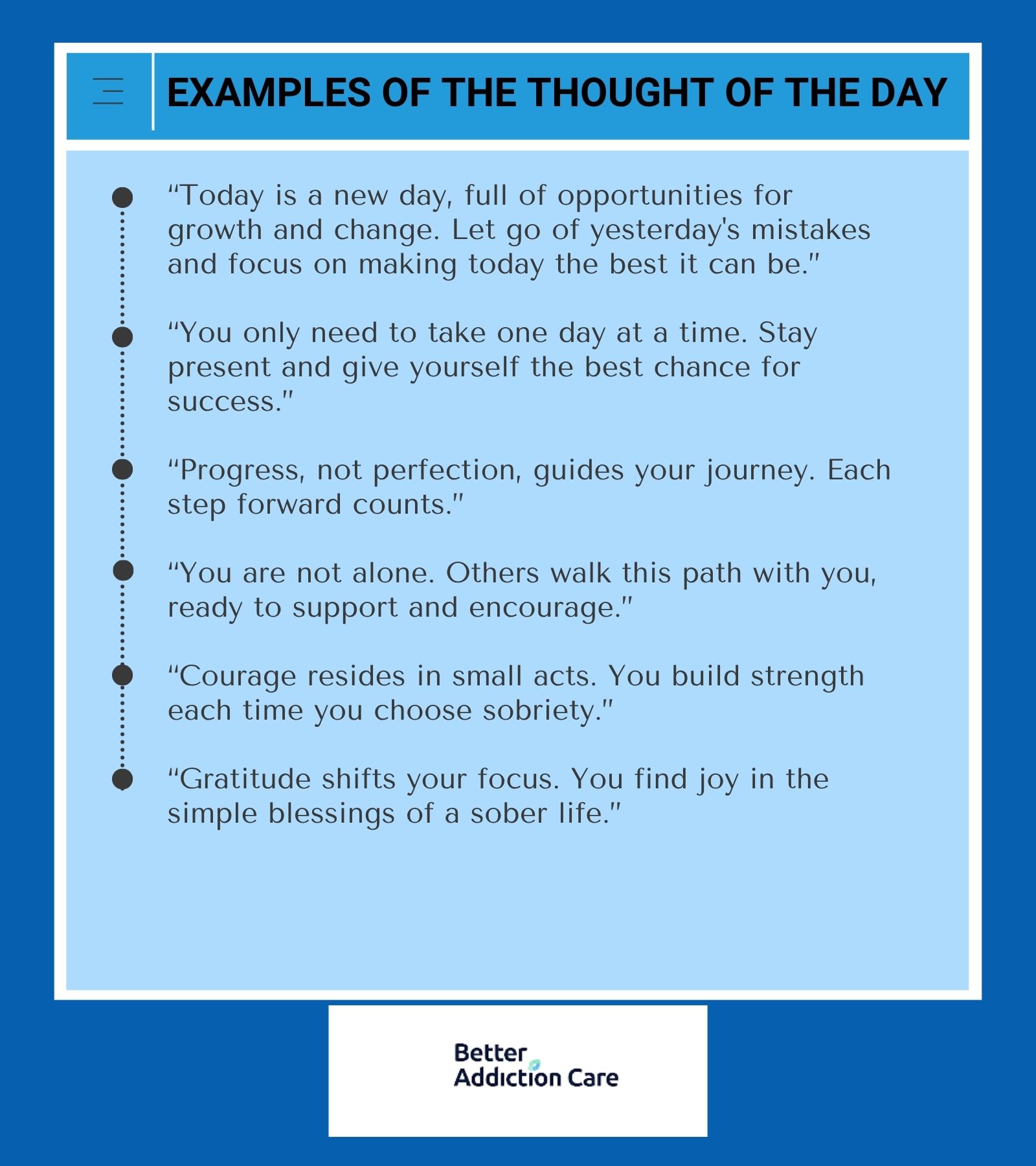
Follow the AA thought of the day to anchor yourself in daily inspiration and practical wisdom that supports your recovery journey. These messages encourage you to reflect on your victories and challenges, helping you build self-awareness and mindfulness. By engaging with these daily thoughts, you strengthen your sense of belonging within the AA community and remind yourself that you are not alone in your struggles.
Follow the AA thought of the day to anchor yourself in daily inspiration and practical wisdom that supports your recovery journey. These messages encourage you to reflect on your victories and challenges, helping you build self-awareness and mindfulness. By engaging with these daily thoughts, you strengthen your sense of belonging within the AA community and remind yourself that you are not alone in your struggles.
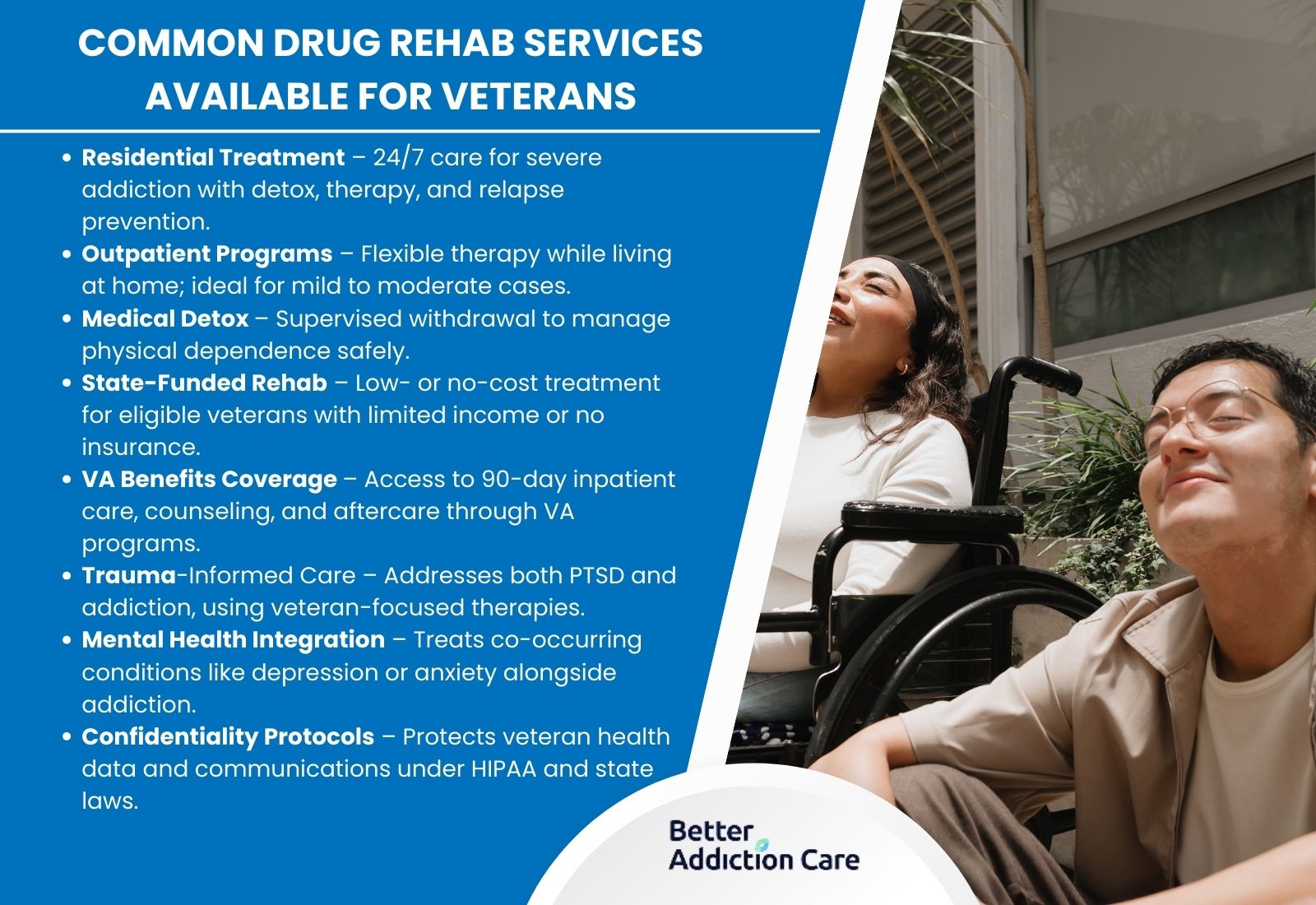
Veterans have access to various drug rehab services, including residential treatment, outpatient programs, medical detox, state-funded rehab, VA benefits coverage, trauma-informed care, mental health integration, and confidentiality protocols.
Veterans have access to various drug rehab services, including residential treatment, outpatient programs, medical detox, state-funded rehab, VA benefits coverage, trauma-informed care, mental health integration, and confidentiality protocols.
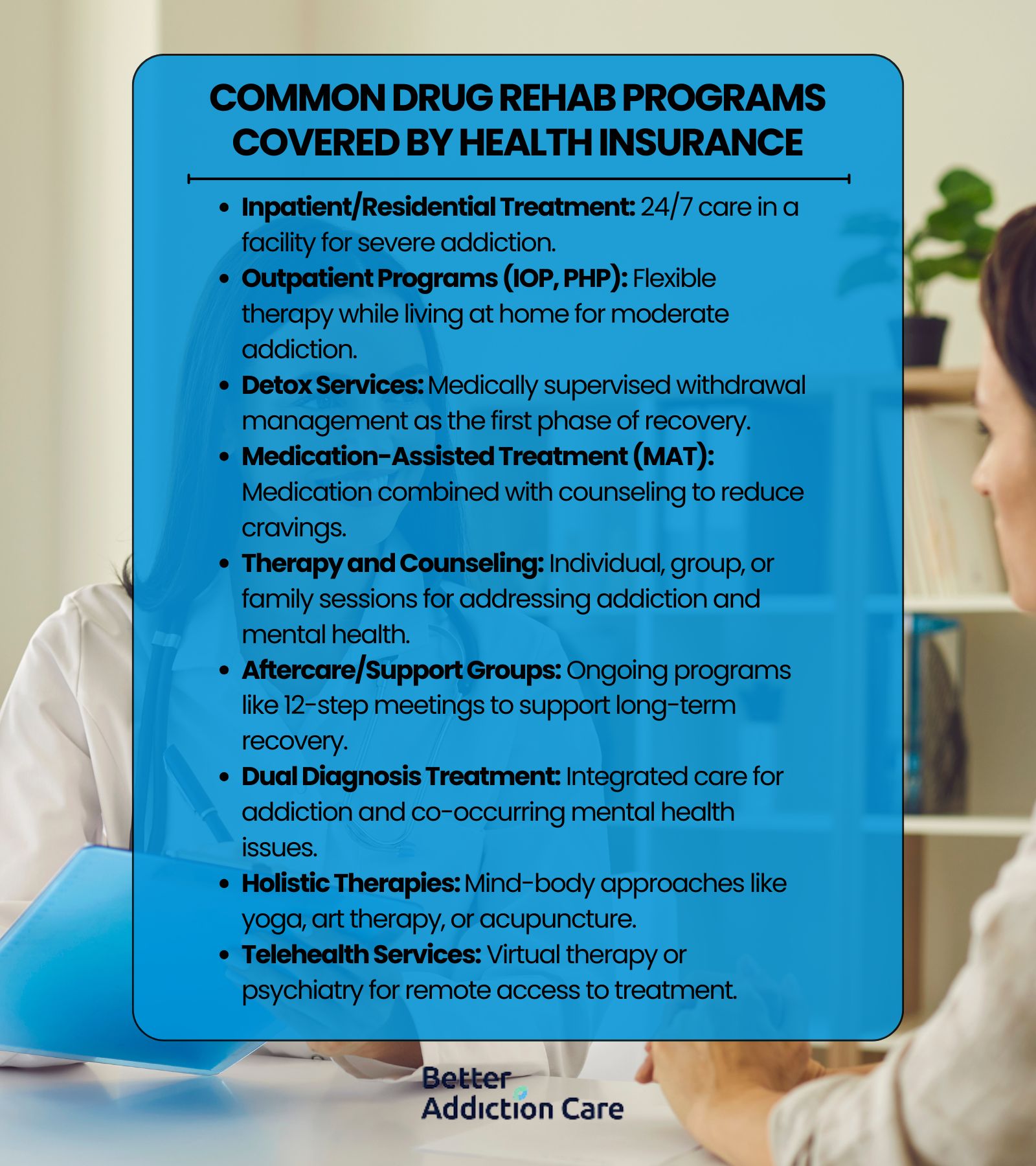
Drug rehabs covered by health insurance offer a variety of treatment options, including inpatient and outpatient services, detox, counseling, and medication-assisted treatment. Health insurance covers drug and alcohol rehab services, and the Affordable Care Act mandates this coverage. The specifics of the services available vary by plan.
Drug rehabs covered by health insurance offer a variety of treatment options, including inpatient and outpatient services, detox, counseling, and medication-assisted treatment. Health insurance covers drug and alcohol rehab services, and the Affordable Care Act mandates this coverage. The specifics of the services available vary by plan.
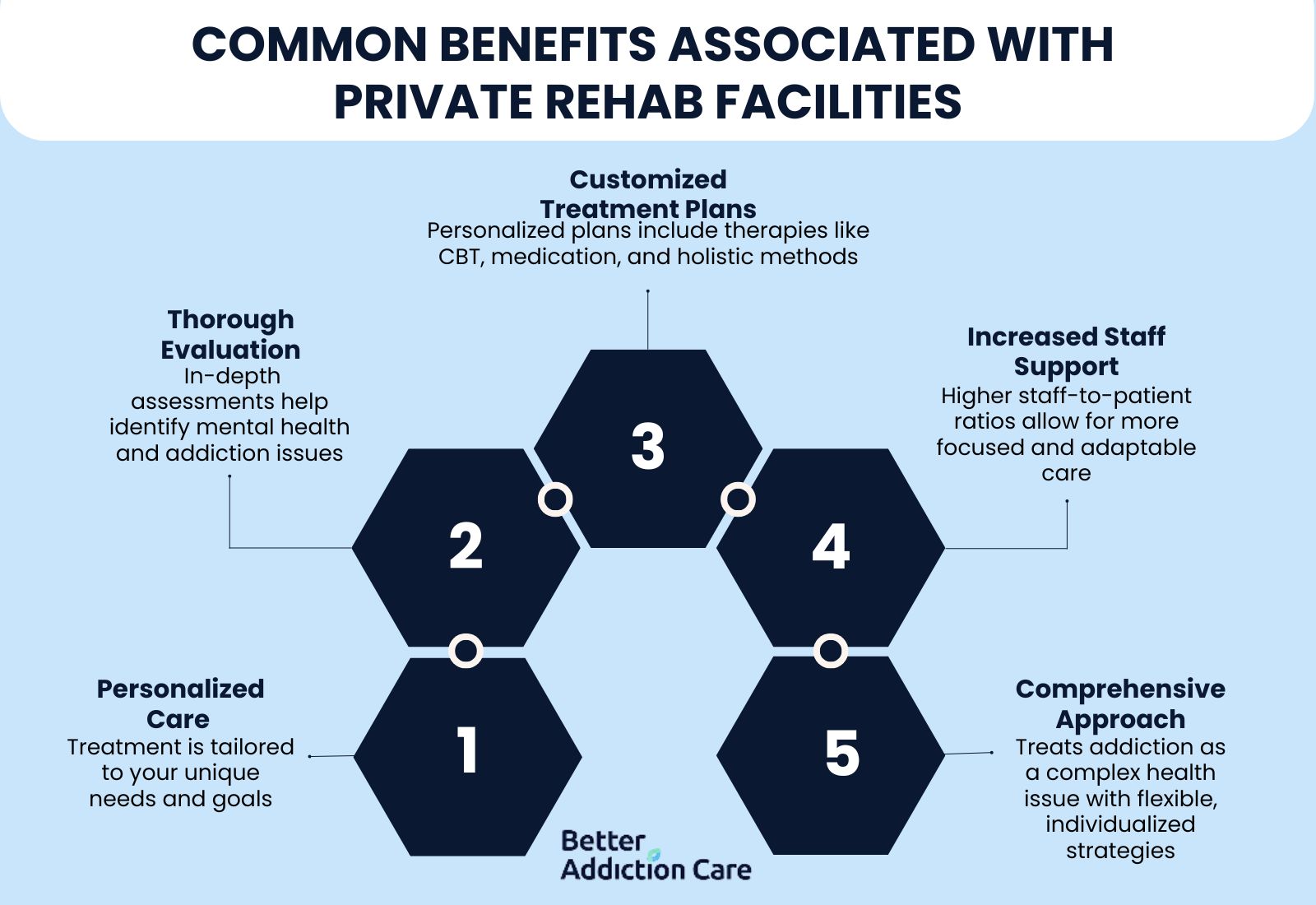
Private rehab centers provide specialized addiction treatment with personalized care, upscale amenities, and comprehensive support. Benefits of private drug rehab centers include tailored treatment plans, higher staff-to-patient ratios, and a multifaceted approach to care. With approximately 107,000 people dying from drug overdoses in 2021, according to NIDA, access to high-quality treatment is critical, especially considering only 6.5 percent of the 40.3 million Americans with substance use disorders received any treatment in 2020.
Private rehab centers provide specialized addiction treatment with personalized care, upscale amenities, and comprehensive support. Benefits of private drug rehab centers include tailored treatment plans, higher staff-to-patient ratios, and a multifaceted approach to care. With approximately 107,000 people dying from drug overdoses in 2021, according to NIDA, access to high-quality treatment is critical, especially considering only 6.5 percent of the 40.3 million Americans with substance use disorders received any treatment in 2020.
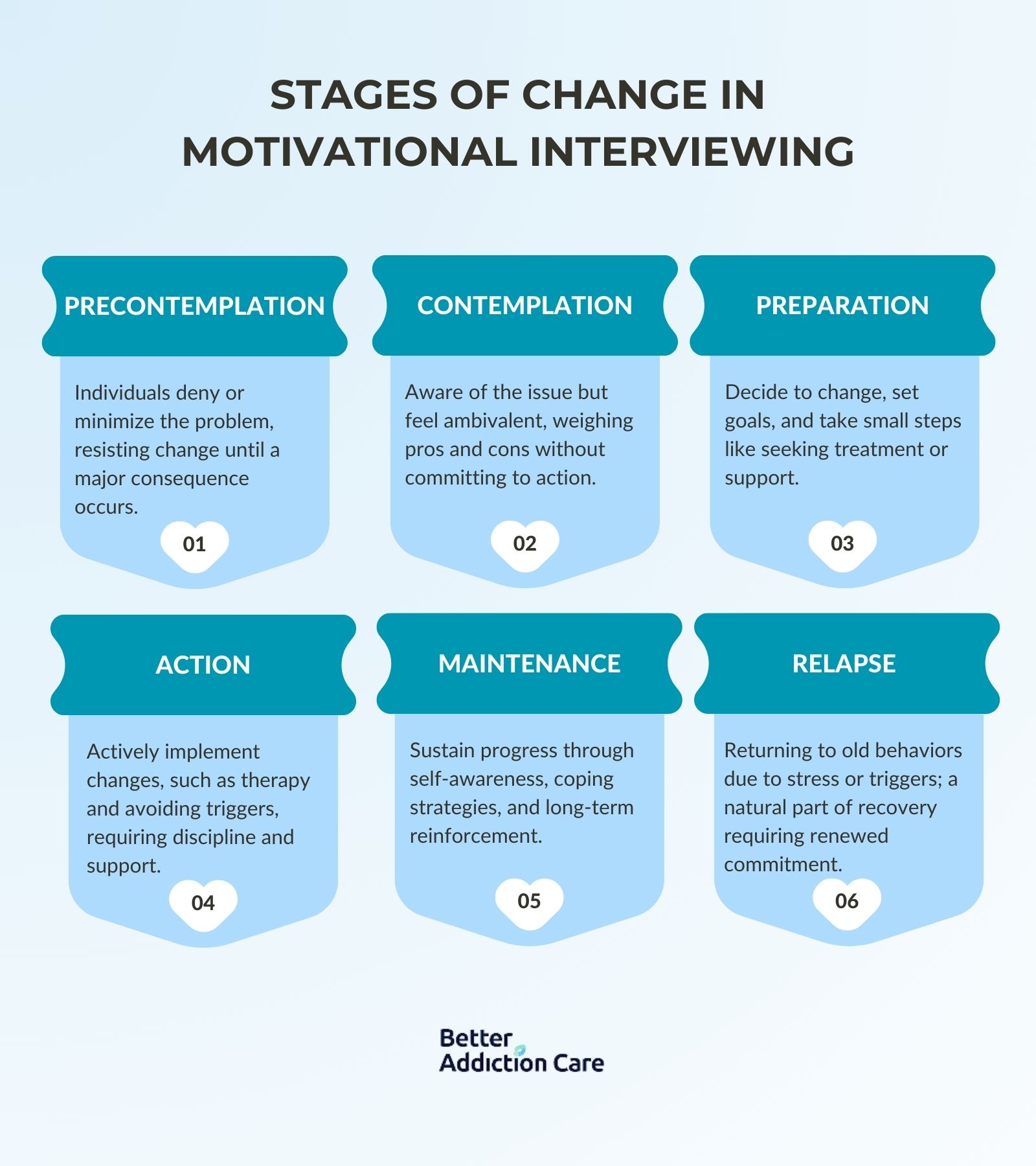
Motivational Interviewing (MI) is designed to enhance motivation for change by resolving ambivalence. It is particularly effective in helping individuals explore their motivations and commitment to changing behaviors like substance use or mental health issues.
Motivational Interviewing (MI) is designed to enhance motivation for change by resolving ambivalence. It is particularly effective in helping individuals explore their motivations and commitment to changing behaviors like substance use or mental health issues.
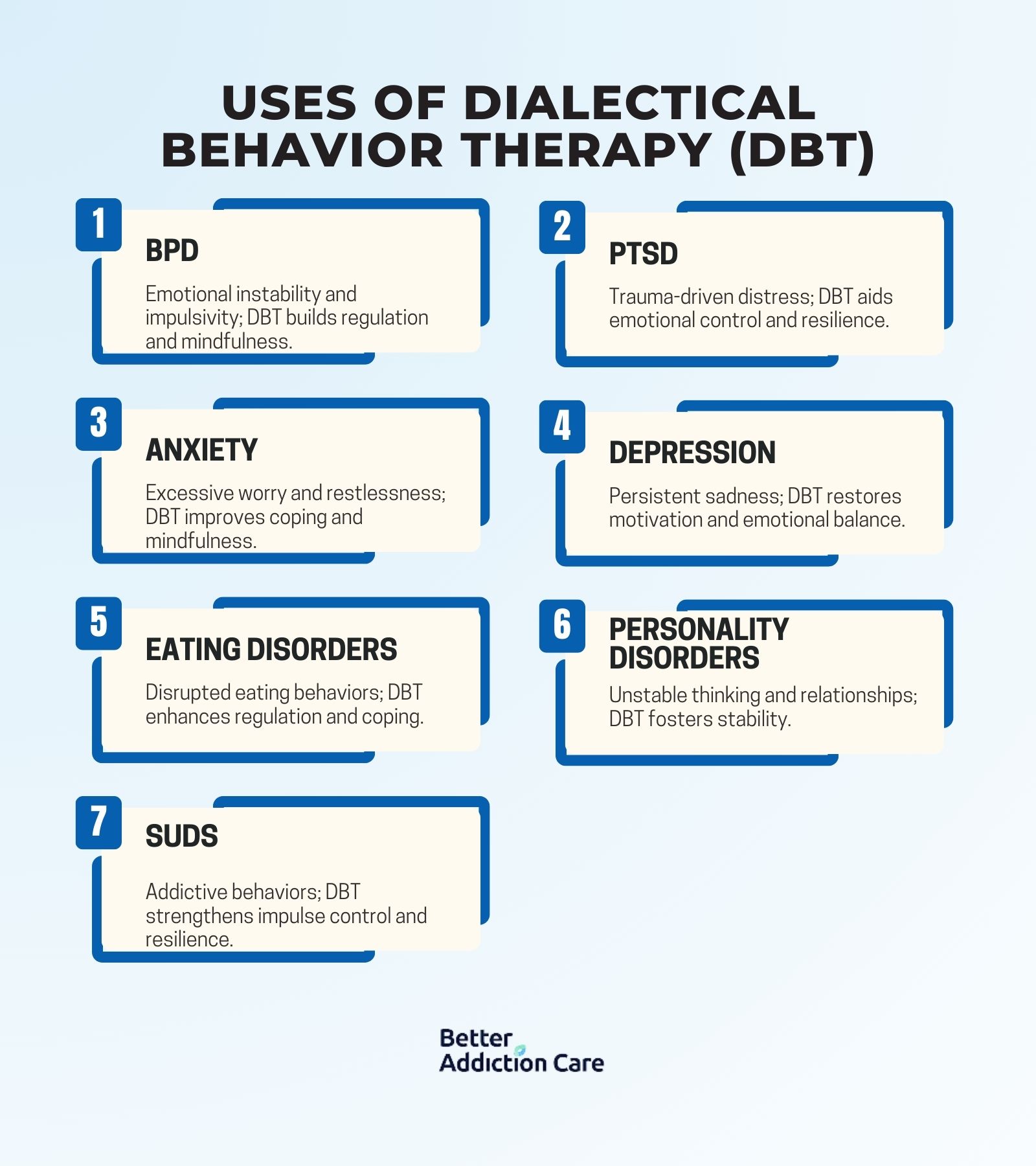
Dialectical Behavior Therapy (DBT) helps individuals regulate emotions, tolerate distress, and improve behaviors, making it highly effective for mental health and addiction treatment. According to a study by Linehan et al.
Dialectical Behavior Therapy (DBT) helps individuals regulate emotions, tolerate distress, and improve behaviors, making it highly effective for mental health and addiction treatment. According to a study by Linehan et al.
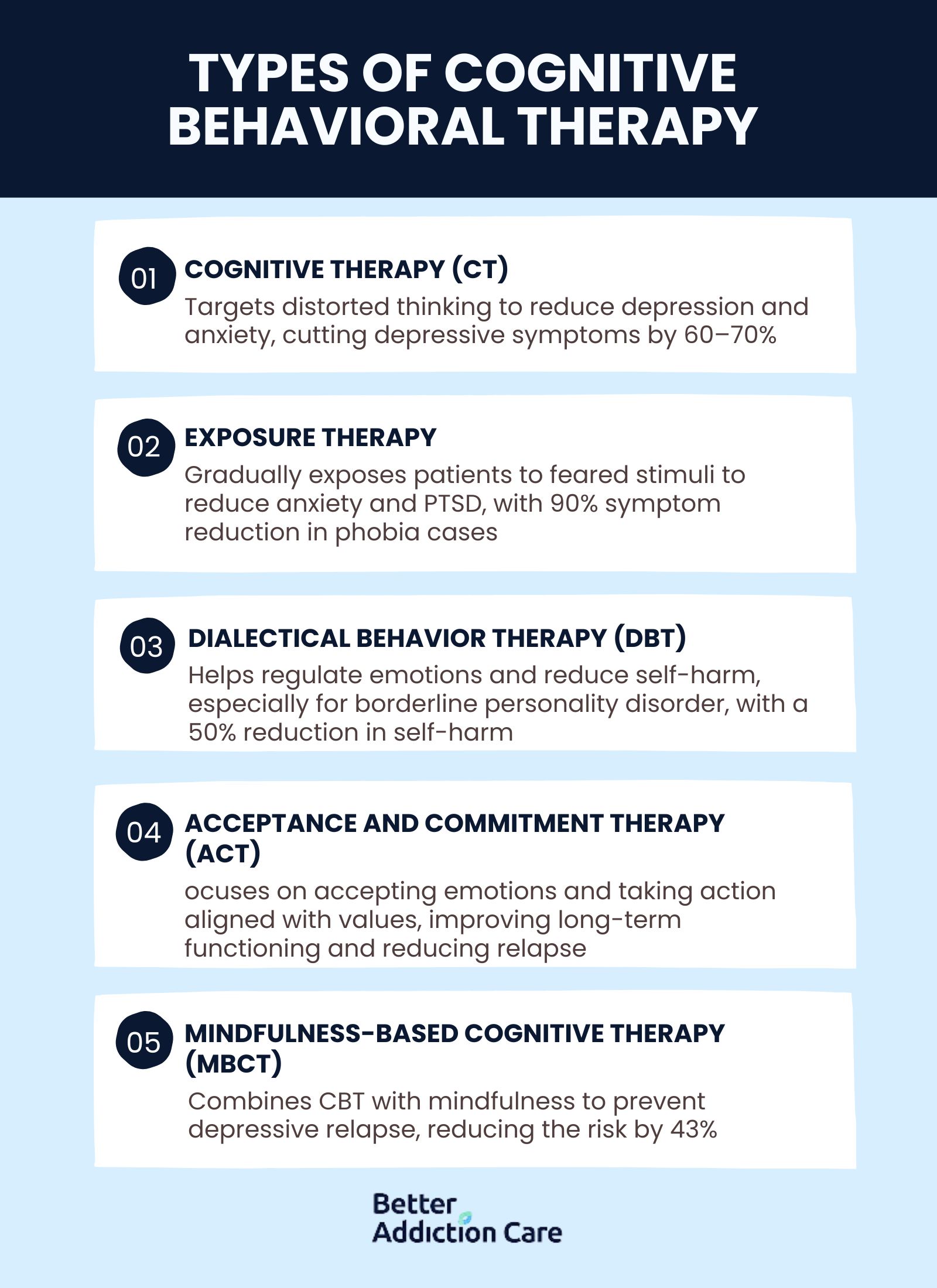
Cognitive Behavioral Therapy (CBT) focuses on identifying and modifying the thought patterns and behaviors that lead to and sustain addictive behavior. It emphasizes active participation, practical skill development, and consistent practice through a structured form of therapy led by trained therapists.
Cognitive Behavioral Therapy (CBT) focuses on identifying and modifying the thought patterns and behaviors that lead to and sustain addictive behavior. It emphasizes active participation, practical skill development, and consistent practice through a structured form of therapy led by trained therapists.
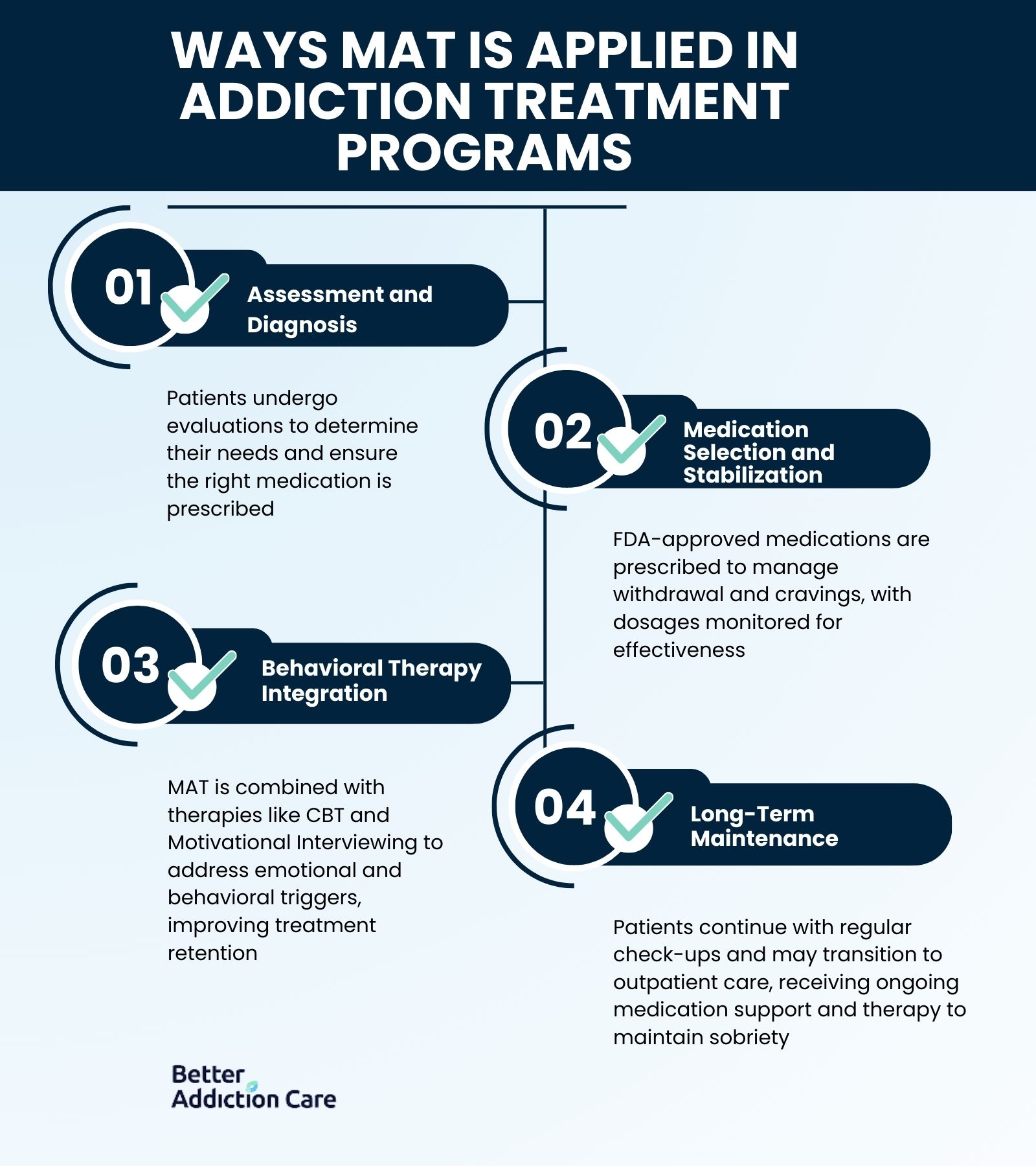
Medication-assisted treatment (MAT) combines FDA-approved medications with behavioral therapies to address both the physical and psychological aspects of addiction. The goal of MAT is relapse prevention, withdrawal management, and sustained recovery, providing a whole-patient approach that supports individuals through detoxification, cravings, and long-term sobriety.
Medication-assisted treatment (MAT) combines FDA-approved medications with behavioral therapies to address both the physical and psychological aspects of addiction. The goal of MAT is relapse prevention, withdrawal management, and sustained recovery, providing a whole-patient approach that supports individuals through detoxification, cravings, and long-term sobriety.
